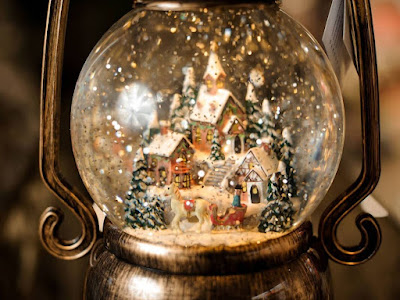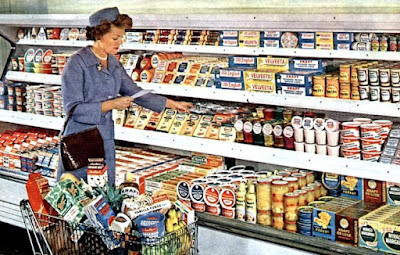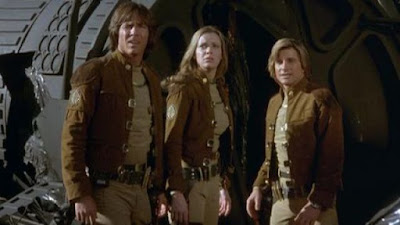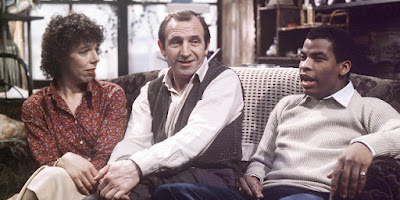I wasn't sure whether anyone would find my musings on atmosphere to be of the slightest interest. But a couple of readers have mentioned, in private correspondence, that they enjoyed the first two instalments, so I shall press on.
In this instalment, I'm going to write about the atmosphere of times-- the times I've lived through.
Actually, I'll begin by talking about a decade I didn't live through. Or rather, I did live through the tail-end of them, but I was probably not very clued-in to the cultural zeitgeist at the time. I'm talking about the seventies. I was born in October 1977. So I'm an eighties kid, but a seventies baby.
The seventies have always been, hands down, my favourite decade. And, now I think about it, maybe that says something about me. Because I just missed out on the seventies, and all my life I've been preoccupied by things I just missed out on.
Here's an example. I started work in UCD's Veterinary Library in January 2006 (I think). I started a FÁS training course in the Allen Library in January 2002. In both cases, I just missed out on the Christmas party, and the Christmas season in general. And in both cases, I felt an extraordinary sense of wistfulness whenever anyone mentioned the Christmas celebrations I had just missed. It was something just out of reach, like the scene beneath the glass dome of a snowglobe.
This sense of wistful disconnection from something that's just out of reach has always haunted me. It can be a pleasant, poetic sensation. I often feel it when looking through a window at somebody who's only feet away from me. The window in the staff room in the library is an excellent example of this. It looks out onto a part of the campus where people are often walking their dogs or just passing by. The window is somewhat elevated so the people passing by are generally not conscious of being looked at. Also, it's a long way from any exit or entrance to the library, so anyone you see there would probably be long gone by the time you could arrive on the scene. In this way, they're an instance of a saying which, when I first encountered it as a kid, seemed overwhelmingly profound to me: "so near, and yet so far".
(Another example of this is looking out the window on a long train or bus journey. For most of the journey, you're not interacting with the environment around you, and you're not going to get out. Your feet haven't touched soil since you climbed aboard. So the scenes around you are, in a sense, somewhat unreal and dream-like.)
Anyway, this tendency to romanticize something I just missed may explain, to my extent, why the seventies are my favourite decade. But I don't think it's most of the reason.
When I try to probe my own feelings about the seventies, the first thing that occurs to me is that the sixties were over. This might seem a very negative reason to love a decade, but I don't think it necessarily is.
The utopian, revolutionary, Year Zero fervour of the sixties was over-- or rather, its first wave had broken. As far as I can remember, I've always hated that sixties revolutionary spirit. It nauseates me, and it always has. I found it disturbing as a child. And not just the sixties, really, but the whole wave of pop culture, consumerism and mass production that really hit in the fifties: television, supermarkets, package holidays, and all that. The pop culture of this time seems completely infatuated with everything new and shiny.
Well, that was gone, and there was something of a conservative reaction, especially in the USA. Modernism was replaced by post-modernism, which (in its more benign forms) was a re-embrace of tradition and the past, and an abandonment of futurist fantasies. Of course, social liberalism continued its long march forward, but rather less confidently and with less moronic utopianism.
And the newness and shininess was definitely gone. The thing that seems noticeable to me about the seventies is the darkness. There seemed to be a universal swing towards darker colours, despite evocations of psychedelia in pastiches like That Seventies Show. Just think of something like Star Wars, which came out in the year of my birth. (Indeed, the deliberately grungy and gritty aesthetic of Star Wars, and the fact that the first film was labelled "Episode IV", seems very representative of the "turn towards the past" of the seventies.) Battlestar Galactica, which came out the next year, had a similar aesthetic.
But what about disco? Is disco dark? Sure. All the flashing coloured lights are set against a backdrop of darkness. (Glitter balls are actually one of my favourite things in the world.)
This dark aesthetic appeals to me very much. I associate darkness with permanence, with timelessness, even with eternity.
Most of my music I love is seventies music: Slade, Horslips, Led Zeppelin, Wings, the Bee Gees, The Sweet, Hot Chocolate. What's notable about this era is that the bands seemed more focused on showmanship and less hung up on the idea of "authenticity". I've read that punk and "indie" music was, in part, a reaction against the "pomp" of bands like Led Zeppelin. But surely they were taking the whole thing too seriously. All the flamboyance of bands like Slade and Led Zeppelin were just theatre. They were putting on a show, not trying to start a revolution.
Slade are a perfect example. I wrote this about them in a blog post about music:
What I especially like about Slade is the contrast between their glam aesthetic (the outlandish costumes they wore on stage, for instance) and their rugged, down-to-earth, Black Country attitude. The get-up they wore was theatrical, but their actual music and lyrics were unfailingly man-in-the-street. The contrast becomes even more pointed when we consider the time and place in which they flourished; seventies Britain, the era of the three-day week and endless strikes and industrial disputes. I've always found something deliciously bleary and run-down about seventies Britain, as it appears to me through film and television and other media.
There was definitely a delicious bleariness when it came to the seventies, especially Britain. (But not just in Britain; watch, for instance, the opening scenes of the American films Saturday Night Fever or Shaft.) Everything seemed run-down, worn, weathered, lived-in, and reassuringly solid. The fuzzy footage and grainy photography that come to us from this period only heighten this impression. It's no surprise that Tom Sharpe started publishing his novels at this time. A novel like Porterhouse Blue, with its gleeful portrayal of an utterly moribund and stuck-in-the-mud college in Cambridge, is pure seventies. And, indeed, this sense of decrepitude is even evoked in the very title of the sit-com Rising Damp, set in a rundown boarding house.
Mention of a novel like Porterhouse Blue brings up the continued existence of an English establishment and upper class at this time. Commuters on the London Underground in bowler hats and dark suits, carrying briefcases and walking sticks, were a common comedy trope-- and presumably, they still existed in real life. Tweedy ex-army officers, disciplinarian headmasters, and collar-wearing Church of England vicars were also plentiful in fiction, which presumably reflected real life to some extent. Today, of course, we still have an establishment, but they have much less style.
In my own family and community, the seventies appeared to me as a sort of golden era. My parents were still young parents, and so were many of my aunts and uncles. Extended family get-togethers were frequent, and I saw lots of photographs and heard lots of stories of this time. (I was particularly jealous of camping trips, which never happened in my time.) Similarly, in Ballymun, the high-rise suburb where I grew up, there was still a vibrant community spirit and intact families were still the norm. By the eighties, drugs and crime and vandalism had become endemic in Ballymun, as had single-parent families, and community spirit had declined greatly. Open drug-dealing and discarded syringes were a common sight in my childhood. So in my own "little world", as the wider world, the seventies seemed like something wonderful that I had just missed out on.
This blog post was originally meant to be about several decades, but it's got away for me. The next post, which I'm going to start on straight away, will be about the eighties and nineties.





No comments:
Post a Comment